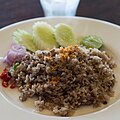Canarium album
| Canarium album | |
|---|---|

| |
| Canarium album leaves and fruit | |
| Scientific classification | |
| Kingdom: | Plantae |
| Clade: | Tracheophytes |
| Clade: | Angiosperms |
| Clade: | Eudicots |
| Clade: | Rosids |
| Order: | Sapindales |
| Family: | Burseraceae |
| Genus: | Canarium |
| Species: | C. album
|
| Binomial name | |
| Canarium album (Lour.) DC.
| |
| Synonyms[1] | |
|
Canarium album Raeusch. [Invalid] | |
Canarium album[2] is a tree species in the genus Canarium and the family Burseraceae, found in Indo-China; the Catalogue of Life does not record any sub-species.[2]
Canarium album produces a fruit commonly called Chinese olive or white olive,[3] though it has no relation to Olea; it is consumed in Vietnam (Vietnamese: trám trắng, fruit quả trám), Thailand (where it is known as samo chin (Template:Lang-th) or kana (Template:Lang-th)) and in China (simplified Chinese: 橄榄; traditional Chinese: 橄欖; pinyin: gǎnlǎn).[4]
The pulp of the tree's fruit and its seeds are edible, with a strong resinous flavor when they are fresh. Culinary oil can be extracted from the seed. Preserves can be made with the fruit, both sweet like jam or pickled preserves. In China, a pickle called olive vegetable (simplified Chinese: 橄榄菜; traditional Chinese: 橄欖菜; pinyin: gǎnlǎn cài), made from a mix of Canarium album fruit and mustard greens, is commonly used as a flavoring for congee and fried rice,[5] with Teochew people specifically being very fond of the pickle.
Mostly cultivated in Thailand, cultivation has been introduced on a smaller scale to Fiji and northern Queensland in Australia. Its fruit, resin and seed are exported to Europe where they are used in the manufacture of varnish and soap.[6]
Gallery
-
Khao phat nam liap dish (with rice) from Thailand
-
Hunanese stir-fry of green beans with olive vegetable
References
- ^ The Plant List (retrieved 14 December 2017)
- ^ a b Roskov Y.; Kunze T.; Orrell T.; Abucay L.; Paglinawan L.; Culham A.; Bailly N.; Kirk P.; Bourgoin T.; Baillargeon G.; Decock W.; De Wever A. (2014). Didžiulis V. (ed.). "Species 2000 & ITIS Catalogue of Life: 2014 Annual Checklist". Species 2000: Reading, UK. Retrieved 14 December 2017.
- ^ GRIN: Canarium album (retrieved 14 December 2017)
- ^ Lars Ragvald, Wai-Ling Ragvald & Susanna Björverud, Norstedts Kinesisk-Svenska Ordbok (Stockholm: Norstedt, 2012).
- ^ "Comfort Cooking: Olive vegetable fried rice | the Straits Times". 27 July 2021.
- ^ Janick, Jules (ed.). The Encyclopedia of Fruit and Nuts. Centre for Agriculture and Bioscience International.
External links
 Media related to Canarium album at Wikimedia Commons
Media related to Canarium album at Wikimedia Commons Data related to Canarium album at Wikispecies
Data related to Canarium album at Wikispecies


